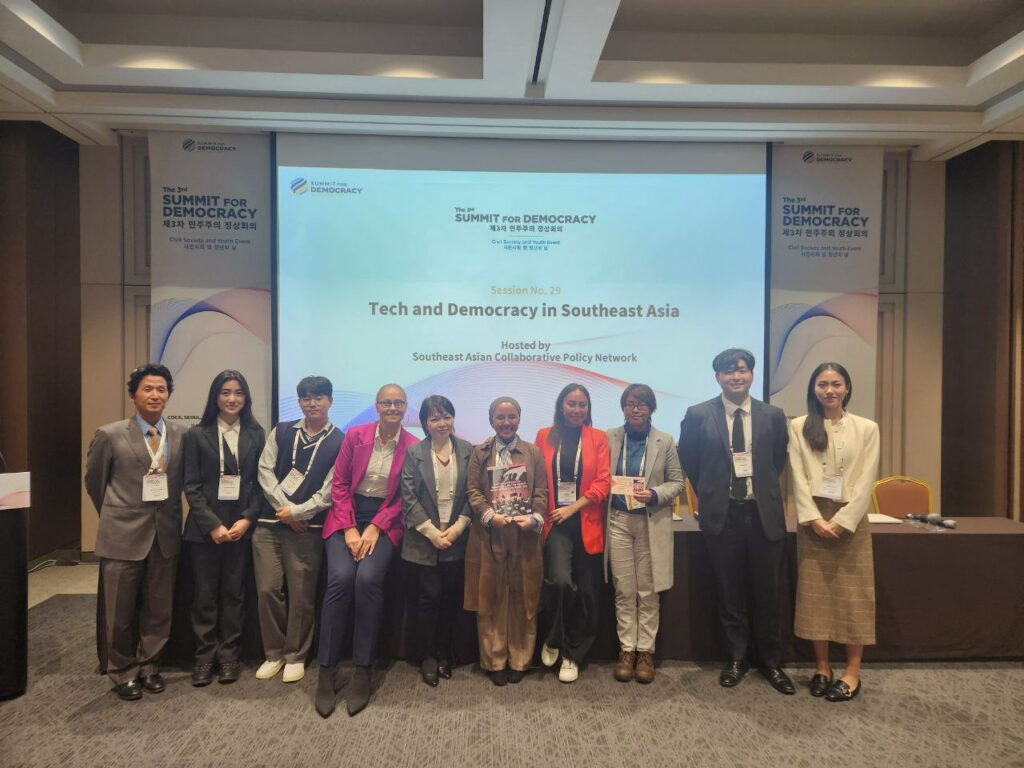Open Net held a workshop titled “Tech and Democracy in Southeast Asia”, March 19, 2024, 4:30 pm to 6 pm at the Summit for Democracy in Seoul partnering with Korea University International Human Rights Clinic (KU IHR Clinic) and Southeast Asian Collaborative Policy Network(SEACPN) with the following themes:

Digital authoritarianism is on the rise in Southeast Asia. Laws criminalizing speech such as defamation, “fake news” law, head of state insult law, and blasphemy law, are used to persecute journalists and human rights defenders criticizing the incumbent government or the ruling majority. Thailand, Vietnam, Myanmar, and Indonesia implemented mandatory “notice-and-takedown” systems where various forms of liability or blocking are imposed on the intermediaries for failure to take down or block webpages in impossibly short timeframes when the government agencies make the requests.
At the same time, social media trolls including the pro-government ones are attacking vulnerable groups with disinformation and hate speech to shrink the latter’s freedom of speech, making it difficult to achieve substantive democracy.
Finally, Asian governments are coming up with various surveillance enablers such as data retention, data localization, identity verification, and warrantless access which can be used by the regimes to identify, investigate, and persecute human rights defenders. Most recently, Vietnam has announced mandatory social media identity verification, a measure that was struck down as unconstitutional long ago in South Korea (2012). Indonesia instituted a system of warrantless access to users’ private data, a system found unconstitutional in South Korea (2022).
Civil society organizations in the region and young law students in Korea would like to discuss the possibility of forming a regional movement to push back against this legislative trend attacking free expression and privacy from international human rights perspectives, and a regional network to collaborate with and challenge ISPs and big techs to push back on censorship orders and data access requests not complying with international human rights standards and discuss principles and protocols in content moderation and data access consistent with international human rights to protect vulnerable populations.
We will be building on discussions at the inaugural seminar of SEACPN (see below) of May 2023 Digital Rights-Asia Pacific (DRAPAC) session in Chiang Mai, Thailand and the August 2023 Asia Pacific Regional Internet Governance Forum (APrIGF) session in Brisbane, Australia on the broader theme of technology advancing democracy.
Moderator:
Kyung Sin PARK, Professor, Korea University Law School; Director, Open Net
Speakers and Papers:
Vietnam’s Steady Steps toward Digital Authoritarianism, Vi TRAN, Legal Initiatives for Vietnam
Vietnam’s Regulation of Fake News, Yihyeon KANG, Korea Univ International Human Rights Clinic
Digital Authoritarianism in the Philippines, Darlene Ramos GAN, DAKILA; Jihyun KANG, Korea Univ International Human Rights Clinic
Legal Analysis of Digital Rights in Indonesia, Nenden Sekar ARUM, Southeast Asian Freedom of Expression Network; Yongmi KWON, Korea Univ International Human Rights Clinic
Myanmar Analysis, _____________, Article 19 (also speaking on the importance of business and human rights and how it is now related to democracy in the region)
Analysis of Digital Authoritarianism in Myanmar, Jiyong KIM, Korea Univ International Human Rights Clinic
Digital Authoritarianism in Thailand and Laos, Emilie PRADICHIT, Manushya Foundation
Also, Elonnai Hicock, Global Network Initiative, spoke on behalf of the organization that was first involved in the creation of SEA CPN, and focused on the need for multistakeholderism
25 ppl attended in the audience (about half female) and about 20 ppl attended remotely.
What is SEA CPN?
Southeast Asia (SEA) is home to 682.5 million people, which is equivalent to 8.58% of the world’s total population. In terms of internet penetration, 73% of SEA is connected to the internet. Facebook is the most popular social media platform in the region, while YouTube, Twitter, Instagram, Pinterest and TikTok also have significant shares in the market. Other non-Western platforms such as Line, WeChat and Viber also have significant market shares in some countries in the region.
While the internet, including social media and other applications have been beneficial to many, rights violations in the digital space, especially as they relate to freedom of expression and privacy, have also been observed and reported. Journalists, human rights defenders, and activists have reported online censorship, digital surveillance, and harassment. Women and marginalized groups have reported experiencing various forms of online gender-based violence. On the part of governments, some have pursued new rules for Internet users and tech companies on access to Internet, content, data over the past years. In the context of the region, we must not forget that many of these governments were authoritarian in the old days, and some still are until now. While big tech is doing platformization and increased datafication, some governments in Southeast Asia feel that these big tech platforms do not respect their “digital sovereignty” — the vague idea of the existence of national boundaries in the digital realm. Governments thus try to limit the big tech through regulatory frameworks to become a digital dominant, and to rule over the big tech platforms in the end.
Civil society organizations (CSOs) and advocacy groups have called on tech companies to report rights violations on platforms and for these companies to be more transparent, including in their practices, policies, and processes of dealing with complaints and reports. There have been some engagements and dialogues between and among CSOs and ICT companies – including telcos and social media companies – in different forms and at different levels on specific issues. These need to continue for both CSOs and ICT companies to understand each other, find solutions, and provide better services.


0 Comments